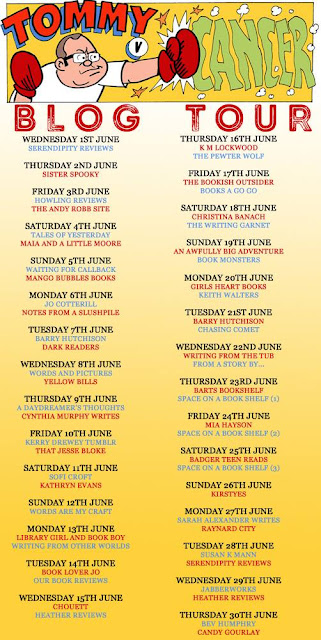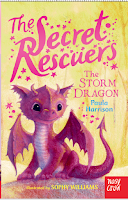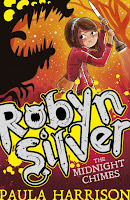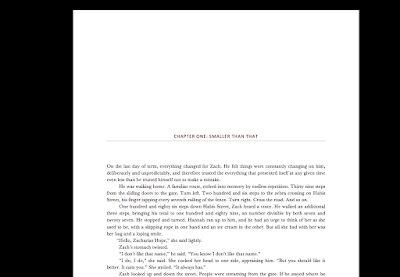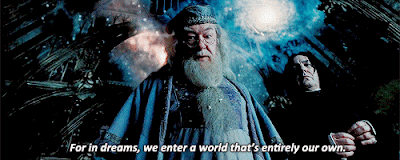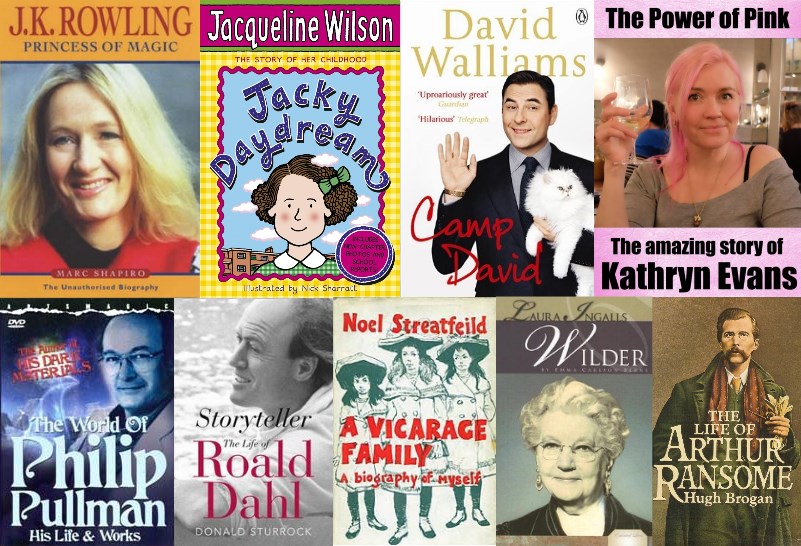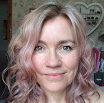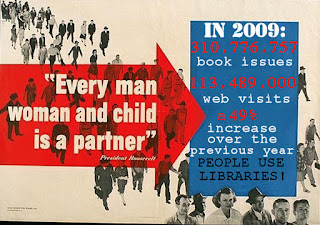Viewing Blog: Notes from the Slushpile, Most Recent at Top
Results 1 - 25 of 390

Candy Gourlay's (recently moved) blog on writing, getting published, surviving the internet, and never ever forgetting that some things we just have to do for love.
Statistics for Notes from the Slushpile
Number of Readers that added this blog to their MyJacketFlap: 3
Blog: Notes from the Slushpile (Login to Add to MyJacketFlap)
JacketFlap tags: friendship, sad books, Addy Farmer, Add a tag
Blog: Notes from the Slushpile (Login to Add to MyJacketFlap)
JacketFlap tags: Jeannie Waudby, Lisa Williamson, Robin Talley, acting skills in writing, Getting in the mood for writing, Add a tag
I started writing a completely different post to this but recent events have put me in a dark mental place and I suspect I'm not the only one.
First there was Orlando. There are no words for the pointless destruction wrought on the people in the night club there. I'm not going to share any more of that hate though, I'm going to share a bit of love:
And then...I won't go into politics here, but most of you reading this will be well aware that the UK is having a referendum on whether or not to leave the EU. I attempted to engage in debate about this - true, informed, educated debate designed to help all involved, including myself, have a better picture of the potential impact of the referendum result.
I was polite, restrained, mildly funny and I got completely trolled on twitter for it. Nasty, aggressive, rude, sometimes moderately informed, always biased and vile team trolling. I withdrew. There was no debate to be had, I was hunted by a group of campaigners actively requesting assistance to "Take down this b*tch."
And now Jo Cox, Labour M.P. for Batley and Spen, has been killed and I don't know if it has anything to do with the referendum but I can't help but feel the nature of some quarters of the campaign verbally reflect precisely the aggressive and violent actions that brought this young woman's life to an end.
I am tearful. I am sad. I am in no mood to write - but....
I have a book to finish.
So how do you control your mood so you can effectively produce what's needed on the page?
1. Listen to music.
Music can turn your mood around - you can pump up your heart rate or swell with emotion if you choose the right sound track. I never listen to music when I'm writing ( well, rarely, sometimes classical tracks) but I often do to get me in the mood before writing. Guaranteed mood changers for me are:
- Eminem's Lose Yourself is my power up track.
- Pharrell Williams Happy to cheer me up:
- Coldplay's Fix You to make me weepy:
2. Pretend:
I used to be an actor, where pretend is your bread and butter. Here are a few simple tricks for you:
- If you're down and you need to not be, force yourself to smile - this can genuinely work.
- If you need to write something upbeat and strong try the Wonderwoman stance. Stand up, raise both arms in a V above your head then bring your fists down to your hips, arms akimbo. Job done. You are powered up.
- Need to write a sad scene but you're full of the joys of spring? This is hard, be prepared to dig deep - think about something really sad that happened to you. Touch all the emotion but don't let it swallow you - this is work, you are using your experience for your writing so you need to control it.
- Stand in front of a mirror and act out your character's part - be sincere and note how your feelings actually feel.
In the light of what's happened recently, I want to recommend a couple of books that make you think and might just make the world a better place.
Jeannie Waudby's One of Us
Robin Talley's Lies We Tell Ourselves.
Lisa Williamson's The Art of Being Normal.
Please make your own recommendations in the comments section.
Play nice. Be kind. Let's be better.
Blog: Notes from the Slushpile (Login to Add to MyJacketFlap)
JacketFlap tags: Add a tag
by Jo Wyton
A couple of weeks ago, I wrote an article for this blog about the usefulness of finding a good network as a writer. Not long after voyaging into the world of Actually Talking To Other People, I signed up for a writing retreat (which you can read an article on here). I don't really know what I was expecting, but I do know that I turned up on the first night a bit of a trembling mess, really. I recall a room full of people sitting on the floor listening to a talk on building a platform (I think. The nerves really were terrible. It might've been a talk on koala bears for all I would've noticed.)
Mostly the nerves were because I hadn't really met many published authors. I had met some at the end of teetering signing queues. And I think it's fair to say that some of those had ended with me nearly getting 'Never Meet Your Heroes' tattooed on my forehead, but quite frankly my forehead is big enough without calling further attention to it.
This particular writing retreat had as its Writer in Residence a certain Tommy Donbavand. It was a great few days - cake, wine, writing - but my favourite moment was something unrelated to the main business of the retreat.
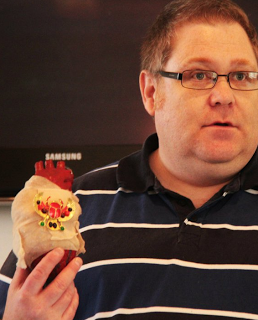 |
| This is Tommy. See? Serious Business. |
This might be a good time to point out that this article is a little different from those that normally appear on this blog, but it's part of something Big. Important. Put That Piece Of Cake You're About To Eat Down And Pay Attention Important. Because Tommy has cancer.
And he needs the support of fellow writers.
And he didn't turn out to be terrifying, after all. In fact, he's one of the nicest bloody people I have ever met.
My favourite moment of the retreat? Several drinks into Saturday night festivities, along with another published author, we retreated into one of the classrooms to... that's right - gather around Tommy's iPad to watch Doctor Who. That's right. Doctor Who. And it was an AWESOME episode.
But what was important was that Tommy invited me in. Made me feel like being a Published Author wasn't an exclusive club. Not an unreachable dream but a much-dreamed-of reality.
He also, incidentally, introduced me to somebody - the other published author staring at the iPad, waiting for the internet to reconnect in time for the big reveal at the episode's end? He's now my other half.
 |
| Tommy shooting Tim Collins (said other half) with a balloon crossbow. Because cakes and wine can't keep you entertained forever. |
So I have quite a bit to repay Tommy, you see. This blog isn't much of a way of doing that, I don't suppose, but I do genuinely think that meeting Tommy played a big part in my existence as a writer, and I'd only encourage others who haven't spoken to many published authors to seek them out. They were once dreamers, too, and they're really very nice (the occasional signing queue aside).
And if you feel like supporting Tommy, who's had to give up the school visits that sustain him financially, you can do one of three things:
1. Buy a copy of Doctor Who: Shroud of Sorrow (which is, naturally, brilliant fun for kids, with a few serious bits thrown in - reviewed here)
2. Enter one of the fabulous competitions being run. You can win TONNES of books. They will appear on some of the blogs, which are listed on the image at the bottom of this blog. The first one can be found here.
3. Visit his blog. Join his Patreon scheme, where you sign up to loads of 'how to write' content.
4.
(Yes, I know I said three, but it's a good one.)
4. Leave a comment on his blog. Offer some support on Twitter or Facebook. Or just raise a glass to his continuing brilliance and friendliness and to your own dreaming. Go on.
Blog: Notes from the Slushpile (Login to Add to MyJacketFlap)
JacketFlap tags: Add a tag
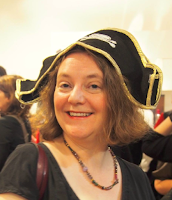 |
| Paula working as a Pirate before she realised she could write like the wind |
We are so pleased to introduce the latest recruit to Notes from the Slushpile, our best-selling writer pal Paula Harrison — she who has sold more than a million Rescue Princesses and seems to have books effortlessly leaping out of her jumper. Recently, Paula branched out from princesses to dragons, unicorns, firebirds and magical foxes. As if that isn't enough, this September, Paula's launching a new middle-grade book: Robyn Silver. What an example for us slow-coaches to emulate and the Slushpile is sooooo lucky to have her! Welcome, Paula ... we're hoping some of your publishing magic dust sprinkles over the rest of us!
I have a book to finish.
No one in my house is impressed by that excuse for not doing the washing up any more. I always seem to have a book to finish. My work squeezes into the school day and spills over into the evening. With two chapter book series to work on and a novel for 9+, I sometimes feel like I’m juggling hoops, whilst riding on a unicycle, whilst taming a lion, whilst... You get the idea.
Drawn because SOME people in my house found it amusing!
Not that I’m complaining. I know how lucky I am to be published and writing full time. But there’s a lot to do and while publishers will move deadlines back for authors of stand-alone books, in my experience they tend not to do so if you’re writing a series. It could be that changing the time gaps between the books is problematic for them. (It's worth mentioning here that I've never written for a packager - all my stories are dreamed up and written by me - but I assume if you do the deadlines involved are not particularly flexible either.)
So I’ve developed a few tricks for writing more than one book for more than one publisher. Authors who have to do this are often picture book and/or chapter book writers. But first here’s a quick round up of what I’m currently working on.
Secret Rescuers is a chapter book series which I’ve largely completed. I’m waiting for copyedits on the last two books.
Robyn Silver: The Midnight Chimes is for 9 + and is DUE OUT IN SEPTEMBER! Sorry did I get a little excited there? Did I mention I have an awesome cover and very shiny proofs courtesy of my new publisher, Scholastic? I’ll be writing more of the second book this summer.
Young detective series with a secret title! This is what I’m currently writing and it’s due out in 2017. Not having written mysteries before, I’m finding I love it. But I can't tell you anything else about it yet!
OK, TIME FOR THE TIPS!
Make a plan
Whether you keep it in your head, note it down on paper or make a spreadsheet on the computer, you need a plan of what you’re going to write and when. It take practice to work out how many weeks or months each stage of a book will need – first draft, edits, copyedits.
My plan is in my head mostly, but if you’re new to managing multiple deadlines I’d recommend using a calendar. Allow yourself a cushion of extra time in your plan because stuff happens! You may get flu or the washing machine may break. Life can get in the way!
Let your agent and publishers know how you’re getting on
If things take longer than you’d expected, let your publisher know. The sooner you tell them there may be a problem, the easier it is for them to try to find you extra time. Nobody wants to be that person who says they can’t make a deadline but with lots of notice it is less of a disaster.
Focus on one thing at a time
Writing is an immersive experience and we live each story as we write it. You can’t do that properly if you’re thinking about the book you’re about to move on to when this one’s finished. You also can’t immerse yourself fully if you’re thinking about the cat’s vet appointment this afternoon.
Find ways to pour yourself into the story. For me, music is an excellent short cut into the mood and mind-set of my story. I have at least one piece of music for each book – sometimes more. Sometimes I find a song that suits a particular character. Then I’ll play it before I start writing.
Objects can also be helpful. For Pale Peak Burning, the last in the Red Moon Rising trilogy, I kept a chunk of granite taken from the Peak District where the book is set on my desk. When I wrote, The Storm Dragon (Secret Rescuers book 1) one of my kids made me a little dragon that sat beside my monitor. I know writers who create mood boards either using collage or online using Pinterest or a similar site. I also change the wallpaper on my computer to suit each story so that as soon as I switch on, I’m in the right frame of mind.
Organise yourself in a way that suits you
Like most writers, I have a large collection of notebooks and I make sure I have plenty written down to refer to. It’s the worst thing in the world to return to your story at edit stage, after spending time writing something totally different, and have gaps in your memory about settings etc. If you think you may forget, write it down or draw it!
Protect your creative time
I’d like to refer you back to Teri Terry’s recent Plot Bunnies blog post here. All this organising, making plans and writing down notes can make you feel as if your writing life lacks colour. You need time to mull things over – to have that unexpected thought that changes the direction of your story. Allow time in your schedule for this – the creative spark is what brought us all to writing in the first place.
(Pssst! If anyone says you’re writing too many books remind them that Shakespeare wrote 37 plays and 154 sonnets! Taking 7 years to write a book is absolutely fine and so is taking 4 months. Let's embrace our differences as writers - be that many books or few!)
No deadlines were missed in the writing of this blog!
Blog: Notes from the Slushpile (Login to Add to MyJacketFlap)
JacketFlap tags: Add a tag
by Jo Wyton
Writing is a lonely business, or so the saying goes. But I haven't found that to be true. Writing requires time spent alone, for sure, but there is no requirement for it to be lonely.
And, thankfully, there are many ways to find connections in the world of writing and writers - you just have to look. Not that this fact occurred to me whilst I was writing my first manuscript. No. For many years I worked on that book. And it was terrible - I mean, really terrible. And it didn't particularly improve in that time. It simply changed. Over and over and over again.
 |
| Oh, the endless rewrites! Oh, the endless exhaustion! |
Read more »
Blog: Notes from the Slushpile (Login to Add to MyJacketFlap)
JacketFlap tags: Add a tag
By Nick Cross
When I used to write a blog post every week, it was easy – I sat down on Thursday lunchtime and typed out 500 words. Then on Friday lunchtime, I went through, edited it and posted it. But now that I only post every couple of months, the whole process has become unaccountably difficult.
Let me elaborate. As it’s my 44th birthday today, I thought I would write a post all about getting older and how it's affected my writing. And I did – there’s 900 words of it in a separate Word file. But the more I wrote that post, the more I didn’t want to write it – it was moany and self-pitying and frankly a bit dull. Even so, for the last couple of weeks, I’ve been slogging through it, adding a few words every day but never getting it into a shape where I’d want to actually show it to anyone.
So, with only a couple of days left before this post goes live, I did one of the most frightening and powerful things a creative person can do.
I started again.
Read more »
Blog: Notes from the Slushpile (Login to Add to MyJacketFlap)
JacketFlap tags: Writing, Plot Bunnies, Teri Terry, Making Things Up, Add a tag
by Teri Terry
a.k.a. the Bunny Whisperer
Part 4 in Making Things Up: a blog series about the creative process.The other day I was chatting with one of my fellow bloggers - Addy - and made a comment about Plot Bunnies, when she said....
What is a Plot Bunny?
Just in case any other writers out there aren't in with the Plot Bunnies, here we go!
 And if this is all sounding rather daft to the sensible, here is the literary kudos. Although Plot Bunnies have been around since the beginning of time, Steinbeck phrased it rather nicely:
And if this is all sounding rather daft to the sensible, here is the literary kudos. Although Plot Bunnies have been around since the beginning of time, Steinbeck phrased it rather nicely:Ideas are like rabbits. You get a few and learn how to handle them, and pretty soon you have a dozen. John Steinbeck

Plot Bunnies inhabit your daydreams, your unconscious, your subconscious, everywhere you're not using logic or conscious thought, and they want attention. One bunny leads to another, and another, and another - and you never know where they might take you.
They can be distracting, but ignore them at your peril. They are the lifeblood of being a writer.
It can be very tempting when you're deep in the writing cave to ignore your Plot Bunnies. You're a Serious Writer; you have a deadline, whether self-imposed or in a contract. You are focused, committed, and you will write 1000 words or whatever you've set yourself and you will finish chapter X. Serious Writers don't have time for the bunnies.
WRONG.
Plot Bunnies are your friends, and they must be cared for and nurtured. If they are, they refuse to go away until you write them. They are those ideas that wiggle and jump inside your head for attention; they must be written. They NEED to be written. They will make your writing better. They may make you waste time now and then, true, but if you routinely quash them down, they may not be there when you need them.

So, how do you encourage visits by these shy and elusive creatures? This depends on the writer and Plot Bunnies involved.
My Plot Bunnies need the following:
Tea. Lots of tea, in mugs with interesting or inspirational messages (Don't Panic, above, is one of my favourites).
Notebooks. usually brightly coloured, with or without frogs and hamsters.
The *right* pens.
Appropriate T shirts: particularly favoured if actual bunnies are involved, as above.


Naps.
Walks.
Environmentally unfriendly long showers, where I'm so away with the Plot Bunnies that I can't remember whether I've washed my hair or not and have to start over again.
Sometimes, even chocolate and wine!!
| Banrock, Chief Muse and Plot Bunny Wrangler, has been there since the beginning: here he is with Slated proofs - back in 2011! |
No matter how important and serious your writing is to you - and believe me, mine is to me - without enough of the crazy, it just doesn't work.
 |
| Thanks to Cathy for the photo of her bunny, Alice |
Blog: Notes from the Slushpile (Login to Add to MyJacketFlap)
JacketFlap tags: K M Lockwood, writing software, word, Scrivener, yWriter, Kathryn Evans, Jo Wyton, Add a tag
| Thanks giphy.com |
A writer can scribe on anything - if you have an idea and you're anything like me, you've probably scrawled stuff down on napkins, the back of your hand and old bus tickets. None of these are very practical though - and you'd probably struggle to write a novel on them. I used to write mainly in Word, with a notebook by my side to make notes as I went. Then I discovered writer's software. For the disorganised amongst us ( me) it's an absolute godsend.
Scrivener is my software of choice but I've drafted in a little help from Jo Wyton, to speak up for Word, and Philippa Francis for yWriter. If you're a fan of something else, please let us know the pros and cons, and where you can get hold of it, in the comments!
Price range:
Platforms it works on: Windows only.
Available support: Not sure how good the support is but there isn't much to go wrong - if you can answer this please add to the hive mind in the comments!
How do you use it:
 |
| An old Kathryn Evans script on yWriter 5 |
Pros then?
Cons?
Kathryn Evans on Scrivener
Price range:
You can download a free trial for 30 days and it only counts the days you actually use it. To buy the full version is $40, forever.
It's worth giving it the full time trial. I'd forgotten this until I looked up my blog from four years ago
So much so that I'm a complete convert.The 30 day trial period is about right. It took me a while to love this piece of software. I resented it in the way I used to resent tidying my room. Slowly, however, I learned to appreciate it.
Platforms it works on: Mac and Windows - there is a version in the pipeline for iPad but it's been a long time coming and no real sign yet.
Available support: Excellent - it might take a day but they respond to email and will always help - there's also some brilliant forums where you can quite often find answers to your questions.
How do you use it:
I now write, and edit, my whole novels in it. It's very easy to divide each chapter into scenes, add notes to the side, even pictures and character notes. I'm lazy with it really - I coudl and should use it better - by giving my scenes titles, for example, I could more easily manage a structural edit - even so, it's clear to see and overview. Once I need to send it to my agent and/or editor, I compile the document and move it to word. I do all future edits in Word but this is mostly because they don't use Scrivener and it's easier to work with their tracked changes where they are.
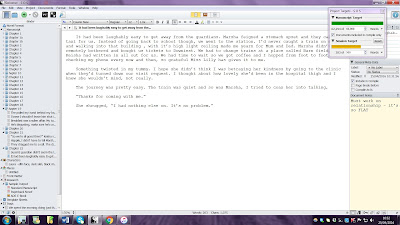 |
| My current WIP in Scrivener |
Pros then?
I find it intuitive to use but if you don't, the tutorials are easy to follow. Heaps of useful content and ways to use it. The word count / target word count box is invaluable. It's great for the more disorganised amongst us (me) and it looks nice too!
Cons?
There is a lot of potentially useful content that I don't access because I can't be bothered to work it out. Not really a con of Scrivener.
Jo Wyton on Word.
Platforms it works on: Windows and Mac (for reference, I'm a Mac user)
Available support: Like with Scrivener, although probably to an even greater extent, there are forums galore for software support.
How do you use it:
Pros then?
I already know how to use it, so there's no time spent learning the how. It also makes it unbelievably easy to transfer files between computers to work on. For example, I have a desktop Mac as well as a notebook, and having things in Word just makes it so easy. I can also transfer to Windows computers for printing etc without worrying about having to reformat. I also love the 'full screen' mode, which is similar to Scrivener in that it block all else from your screen, has changeable backgrounds, etc.
Cons?
Some might find it overly simple for building a manuscript in. But for me, the simplicity is its main draw.
So there you go - I have to say I would REALLY miss Scrivener if I didnt' have it. I broke the target word count last week and it drove me crazy not having it - it was like all the words I was writing didn't even count. Thank goodness for the support forums, once I'd fixed it I had a lovely ( 2000+ word) surprise.
Conclusion? If you've got an untidy brain , writer's software that can take you to a whole new level of organisation is really worth it. Do add your own experiences in the comments - it all adds to the hive mind!
Special thanks to Jo Wyton and Philippa Francis, aka K M Lockwood
Kathryn Evans is a stalwart SCBWI member. She tweets @mrsbung and hangs about on instagram kathrynevansauthor. She's got a book out too,: More of Me was published by Usborne in February 2016.
Blog: Notes from the Slushpile (Login to Add to MyJacketFlap)
JacketFlap tags: Learning, Plot, Structure, Pacing, Margo Lanagan, confessions, Michelle Magorian, Bernard Beckett, Sarah Waters, Jo Wyton, Elizabeth Wein, Amy Butler Greenfield, Add a tag
Writing exists around that other time-consuming thing in my life: a full time job. And I love my job, so that’s OK by me.
But is does mean that when I come to work on a manuscript, I feel under pressure to do something Great with it.
I jump right in. Maybe I re-read the last few paragraphs I wrote, maybe I just get on with it. Maybe I pick up an existing scene, maybe I write a new one. Maybe it’s planned, maybe it’s not.
Whilst I have usually planned the plot out, I have always been someone more comfortable with winging it than properly planning it.
And that’s fine, except that I was reading Candy Gourlay’s post from a few weeks ago and felt the need to try to do things a little differently.
Why don’t I plan more? Is it because it doesn’t work for me, or because in the limited time I have I prioritise the writing itself? Or is it – gulp – because I’ve never taken the time to learn how?
In an odd turn of events, I currently have the time, and it’s coincided wonderfully with having the inclination. Sitting next to me on my desk: Story by Robert McKee, Writing Children’s Fiction by Yvonne Coppard and Linda Newbery (from whom I have already been lucky enough to glean pearls of wisdom and kindness generously gifted on an Arvon course), On Writing by Stephen King and Reading Like a Writer by Francine Prose.
Just as importantly I have surrounded myself by my favourite books, and have gone through each wondering for the first time why exactly they stick in my mind as favourites. Michelle Magorian's Goodnight Mister Tom and Elizabeth Wein's Code Name Verity for the depth of friendship invoked, Margo Lanagan's Tender Morsels and Bernard Beckett's August for their wondrous use of language, Amy Butler Greenfield's Chantress for its use of setting to reflect the characters perfectly – the list goes on.
Reading these books again and trying to break them down goes against instinct, but as Sarah Waters wrote in a 2010 Guardian article, “Read like mad. But try to do it analytically – which can be hard, because the better and more compelling a novel is, the less conscious you will be of its devices. It’s worth trying to figure those devices out, however: they might come in useful in your own work.”
Diving head-first into learning how to write better, rather than spending the time writing the manuscript itself, feels somewhat intimidating, but cometh the time, cometh the writer. Probably.
Blog: Notes from the Slushpile (Login to Add to MyJacketFlap)
JacketFlap tags: dreams, inspiration, BFG, Addy Farmer, Roadl Dahl, Add a tag
The Dreamers of Dreams by Addy Farmer
We are the dreamers of dreams - Roald Dahl
She said that me being in my own funny little world was a bit frustrating for her; however, she thought that that dreamers were important. The important bit made me feel ten feet tall but with little idea of what she was on about since most of my mental meanderings were to do with going to Sweety Land where I could eat everything in sight or jumping into a puddle which took me to the seaside or rescuing a sad donkey/mouse/rabbit from certain doom.
 |
| A real donkey being rescued! Don't worry - he was fine and happy |
Only in our dreams are we free. The rest of the time we need wages. Terry Pratchett
 |
| It was all a dream ... |
And then, in dreaming,Back to Granny. When I was about eight I had an incredible experience. I so loved being with Granny at her house and I would frequently dream about being there. One night, I dreamed about my bedroom in that house - the perfumey scent, the sunshine on the bed, the creaking wardrobe door. I woke up and for a glorious few seconds I was there - in that bed, in my granny's house and my happiness was like sunshine. It lasted no time and I woke up again, confused and with a terrible weight of disappointment and a fierce yearning to be back there. Sometimes, I think that this it is what being a ghost might feel like - a tremendous yearning to get back to life. I haven't knowingly used this experience in my work but I recognise it in other stories.
The clouds methought would open and show riches
Ready to drop upon me, that when I waked
I cried to dream again. Caliban, The Tempest, Shakespeare
 |
| Don't let her in, you fool |
knocking my knuckles through the glass, and stretching an arm out to seize the importunate branch: instead of which, my fingers closed on the fingers of a little, ice-cold hand. The intense horror of nightmare came over me: I tried to draw back my arm, but the hand clung to it, and a most melancholy voice sobbed, "Let me in—let me in!"Set on the wild and windy moors, Bronte’s Victorian classic has lots of dream-like qualities. There are several occasions when characters are guided by their dreams. The character Lockwood has an unsettling dream about a brawl at an endless church sermon while staying at Wuthering Heights, while Catherine accepts a marriage proposal from Edgar after connecting a dream about going to heaven with their union.
‘I have dreamt in my life, dreams that have stayed with me ever after, and changed my ideas; they have gone through and through me, like wine through water, and altered the colour of my mind. And this is one: I’m going to tell it – but take care not to smile at any part of it.’ the HousekeeperThere are those books which deal directly with dreams like one of my favourites, 'Marianne Dreams' by Catherine Storr.
Ill and bored with having to stay in bed, Marianne picks up a pencil and starts doodling - a house, a garden, a boy at the window. That night she has an extraordinary dream whereby she is transported into her own picture, and as she explores further she soon realises she is not alone. The boy at the window is called Mark, and his every movement is guarded by the menacing stone watchers that surround the solitary house. This story is creepy, disturbing and I realised that it echoed one of my own childhood nightmares where a witch lived in the house next door and I had to devise lots of ways to escape her attentions.
How about Harry Potter and the Order of the Phoenix. There is a door at the end of a silent corridor. And it's haunting Harry Potter's dreams. Why else would he be waking in the middle of the night, screaming in terror?
As with Agamemnon’s dreams, courtesy of Zeus (I've waited a long time to reveal that nugget of knowledge), Harry is also led astray by subconscious thoughts implanted by a villain.
 |
| I love a spooky door |
I cannot write about dreams without referring to Alice in Wonderland by the peerless Lewis Carroll
Lewis Carroll really took full advantage of the limitless possibilities of writing within a dream setting. The 19th century author used Alice’s ability to get lost in the dream state and make connections and observations in her real life – much like we all actually do when dreaming.
‘Yes, that’s it! Said the Hatter with a sigh, it’s always tea time.’
Then there's, Mary Shelley's, Frankenstein
With a head full of an evening’s talk of reanimation and galvanism, Mary Godwin did not sleep well: “My imagination, unbidden, possessed and guided me, gifting the successive images that arose in my mind with a vividness far beyond the usual bounds of reverie?.I saw the pale student of unhallowed arts kneeling beside the thing he had put together. I saw the hideous phantasm of a man stretched out?” She realized she had found her “ghost story.” “What terrified me will terrify others; and I need only describe the spectre which had haunted my midnight pillow.”
Twilight by Stephanie Meyer
In June of 2003, suburban Arizona mother Stephenie Meyer woke up from an intense dream in which two young lovers were lying together in a meadow, discussing why their love could never work. On her website, Meyers says, “One of these people was just your average girl. The other person was fantastically beautiful, sparkly, and a vampire. They were discussing the difficulties inherent in the facts that A) they were falling in love with each other while B) the vampire was particularly attracted to the scent of her blood, and was having a difficult time restraining himself from killing her immediately.”
Dr Jekyll and Mr Hyde by Robert Louis Stevenson
His horror classic also sprang into existence because of its writer’s graphic nightmares. In this case, a “fine bogey tale” tormenting him as he slept grew into one of the most famous and genuinely scary English-language novels ever penned — most especially considering its all-too-human antagonist and protagonist.
"In the small hours of the morning," says Mrs Stevenson, "I was awakened by cries of horror from Louis. Thinking he had a nightmare, I woke him. He said angrily, 'Why did you wake me? I was dreaming a fine bogey tale.' I had awakened him at the first transformation scene ..."
Stuart Little by E.B. White:
One of the most memorable and beloved characters from children’s literature entered into E.B. White’s subconscious in the 1920s, though he didn’t transition from notes to novel until over two decades later. From there, the tiny boy with the face and fur of a mouse became a classic.
Blog: Notes from the Slushpile (Login to Add to MyJacketFlap)
JacketFlap tags: Maureen Lynas, Getting an Agent, Add a tag
 I may be odd but I love going to the tip and on Friday our car was packed with bags of shredding, old computers and cardboard boxes. Tidy house! Hurrah! Geoff was ready and waiting, I was putting my boots on, and the phone rang. I nearly didn’t pick it up - the tip was awaiting! But I did. Right choice!
I may be odd but I love going to the tip and on Friday our car was packed with bags of shredding, old computers and cardboard boxes. Tidy house! Hurrah! Geoff was ready and waiting, I was putting my boots on, and the phone rang. I nearly didn’t pick it up - the tip was awaiting! But I did. Right choice! Elation, relief, exhaustion, acceptance, fear and - determination
Blog: Notes from the Slushpile (Login to Add to MyJacketFlap)
JacketFlap tags: Add a tag
Greetings from the writing cave as I plod my way to a May deadline. Before we begin, may I just say this: AAAAAAARGH!
That's better.
So how do you feel about writing action? Not just the fun action like battles and fight scenes a la Jackie Chan but all the movement that happens in a story. Characters DOING things. Getting from one place to another. Or when a character is building something, like a rocket or a time machine. Or when your character is living out his dull life and time is passing so that you can get to the part where story kicks in.
As I soldier on with my current work in progress, I constantly ask myself, why am I writing it this way? Is there a better way to get my character from A to B?
Read more »
Blog: Notes from the Slushpile (Login to Add to MyJacketFlap)
JacketFlap tags: How to write a biography, Nick Cross, LinkedIn profile, "Kathryn Evans", how to write a bio, twitter profile, Add a tag
Oh look at me, look at all this stuff I do, Aren't I great, aren't I busy?
Blog: Notes from the Slushpile (Login to Add to MyJacketFlap)
JacketFlap tags: Teri Terry, Book of Lies, Thy Bui, book covers, cover design, Orchard Books, Add a tag
 |
| My latest: Book of Lies, published by Orchard Books 24 March! |
I'm taking a break from blogging about writing this time, and moving on to something that can strike hope, fear, joy and despair into the heart of all authors... sometimes at the same time. Yes, you guessed it: book covers.
Covers are so critical to the success of a book. The most amazing book with the wrong cover will struggle; the most average book with the most amazing cover will do well. Them's the facts.
When I first saw the cover for Book of Lies, I was still writing the story. It was love at first sight for me: an amazing cover! Actually possibly the most amazing cover in the history of covers! Though instead of thinking, ok, average insides will do the job, it somehow turned the pressure up a notch to get the story just right.
Considering how important they are, there is very little out there about the shadowy figures behind cover design.
So introducing Thy Bui, YA and middle-grade Art Director for Orion and Orchard:
Thy started her design career at Warner Music UK. The three years on sleeve design gave her a unique insight into the visual world of teens and young adults; the move from music to books was an obvious transition. She joined Orchard Books as senior fiction designer at an exciting time – Orchard were building their middle-grade, teen and YA lists, having acquired incredible talent like Ally Carter, Teri Terry and Jonathan Meres .
At the beginning of 2015 Thy began her role as Art Director for middle-grade to YA fiction, working across the Orion and Orchard list. It was an unique opportunity to work on two distinctly different imprints, and to work with amazing debut and prizewinning talent including Annabel Pitcher, Dawn Kurtagich and Leo Hunt.
I decided to do this blog recently when a reader, Carina, asked me about how you become a cover designer. I emailed Thy, and her reply was so generous and detailed that I asked her if I could blog it. Here it is:
Thy on becoming a cover designer:
 I went to university in Australia and did a Design degree focusing on Visual Communication – graphic design, illustration and typography. The following are known for being good for those graphic design (2 dimensional design as opposed to product and industrial design) focused:
I went to university in Australia and did a Design degree focusing on Visual Communication – graphic design, illustration and typography. The following are known for being good for those graphic design (2 dimensional design as opposed to product and industrial design) focused:- London College of Communication
- Central St Martins
- Kingston University
- University of Brighton
- Cambridge School of Art
 My advice is to completely immerse yourself in book design and design in popular culture – music, fashion, games, film, food, interiors/furniture…everything – as design, and good examples of design and inspiration, crosses all arenas.
My advice is to completely immerse yourself in book design and design in popular culture – music, fashion, games, film, food, interiors/furniture…everything – as design, and good examples of design and inspiration, crosses all arenas. Below are a handful of book cover related sites to check out. There is so much out there, independent designers, design agencies, illustrators etc…so this is just a starting point:
Below are a handful of book cover related sites to check out. There is so much out there, independent designers, design agencies, illustrators etc…so this is just a starting point:  And also follow publishers' instagram/pinterest boards. A lot of them are set-up by the designers and they're a little more inspirational than the actual websites which are set-up by the corporate bods as a business tool rather than celebrating the design side of publishing.
And also follow publishers' instagram/pinterest boards. A lot of them are set-up by the designers and they're a little more inspirational than the actual websites which are set-up by the corporate bods as a business tool rather than celebrating the design side of publishing. 
...and a final word from the author who shamelessly put all her Thy-designed-covers down the side of the blog:
I know how lucky I've been to have Thy as my cover designer for all my covers, from Slated to Book of Lies. I wrote this in the acknowledgements at the back of Book of Lies:
...thanks to Thy Bui, the very amazing cover designer who has done all my Orchard Books covers. I kept looking at the cover for Book of Lies while I was editing it, and thinking, I have to make this good enough to live up to this cover.
 |
| Thanks to Candy Gourlay for the photo |
AND here is most of the Notes from the Slushpile Team at the same party:
 |
| From left: Kathryn, Candy, Jo, Teri (me!), and Addy. Missing are Nick and Maureen. I'd say photo by Candy, as it is in her photos, yet - strangely - she is in the photo... |
Blog: Notes from the Slushpile (Login to Add to MyJacketFlap)
JacketFlap tags: finding focus, creativity, Motivation, mental health, time management, Add a tag
By Nick Cross
A month ago, I wrote the following on the wall of our top-secret Notes from the Slushpile hideout:
In the last week, I have:Why indeed? The Slushpile team were supportive in their replies (apart from Candy Gourlay who I trust was joking when she called me a lazy man!). But for me, the inherent problem lay in that final question. Why wasn't I satisfied with what I'd done, and what did I need to do to make sure that I was?So why do I constantly feel like I'm not doing enough?
- Attended two book launches
- Edited a 1500 word story down to 1000 words for the next issue of Stew Magazine
- Formatted and scheduled next week's Alphabet Soup article and started work on the week after
- Commissioned two more Alphabet Soup articles
- Written a Slushpile blog
- Worked full-time for 5 days
That led me to take a hard look at my own beliefs. For years, I believed that the more busy I was, the more I would get done. But what if that wasn't true? What if I could get better results and more satisfaction by doing less?
Read more »
Blog: Notes from the Slushpile (Login to Add to MyJacketFlap)
JacketFlap tags: Add a tag
If you managed to escape from Addy Farmer's web of distraction post from last week, you might have noticed the passing of World Book Day on Thursday. If you weren't aware of it being WBD, you might have noticed a strange parade of children dressed up as recognisable (or not) book characters streaming towards the school gates.
1. Not yet published, and feeling fresh-faced and youthful after devoting some of your time this week to reading, writing and looking forward to a calm career as an author.
2. Published, and absolutely exhausted after a week spent in five different schools surrounded by boundless enthusiasm and inexhaustible mischief.
 |
| Likely exhaustion level by the end of World Book Day week |
When we get to each school, we will set up tables and stands and decorate them hurriedly with as wide a variety of titles as possible, eager not to topple either the books or ourselves. Then we will rush around madly as children in various guises rush around even more madly, looking for their favourites, discussing the best characters and, with any luck, ready to have something new recommended to them.
 |
| A typical 1980s school book fair. Probably. |
At the time, I don't think there was anybody to help me decide on what to choose. Sometimes that worked out well and landed me with an entirely age-inappropriate love of cannibalism stories.
| Not at all odd to pivot between stories about teddy bears to stories about people losing limbs to sharks. Not at all. |
Luckily, at the schools I'll be heading to tomorrow, there will be book shop staff who know exactly what they're talking about, who know how to open up a child to new kinds of stories without breaking their love for their old favourites. There will be school librarians and teachers, who also know exactly what they're talking about, who know the children and what works for them and what doesn't. On top of which, they'll all have spent at least part of the day with an author. All four of those groups of adults will be there to achieve one thing: to encourage a love of stories.
And that, for me, is the joy of World Book Day.
Blog: Notes from the Slushpile (Login to Add to MyJacketFlap)
JacketFlap tags: Add a tag
by Addy Farmer et al
Well, I'm here to help and after extensive research I have the cat's pyjamas of all things procrastinatoryish. Ooo - I'd better look that up ... Let's begin with some serious animal cuteness.
 |
| Uber cute and uber stylish - who can resist? |
 |
| I can't stop staring at this kitten |
 |
| It's a rabbit, in case you're wondering |
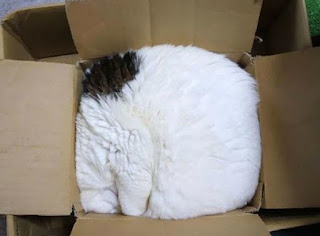 |
| My Cat Likes to Sleep in Boxes |
 |
| You little cutie |
 |
| smoking a pipe and doing the dishes is proven to help your brain Not Write Words |
It's like going round IKEA when you only want 6 wine glasses and a bag of tea-lights and you come out with a sofa and a rather lovely ice cube tray. You can even more easily find any number of things you don't need online without trying terribly hard ...
 |
| Who would be without one of these - writers are fuelled by tea and coffee |
 |
| Nothing says procrastination like a t-shirt |
Getting desperate? Dangerous sports could be the way to go - call it research
 |
| I'm with her .... |
 |
| I'm just out of shot |
 |
| wheeeeeeeeeeeeeee! |
George Kirk Writing lists of what I'm 'going' to do. And volunteering tbh
Kathryn Evans making powerpoints for school visits, shopping, cleaning, budgeting for the farm - READING- walking the dog...googlign myself - I know I know - THE SHAME
Addy Farmer I love dog googling!

Dawn Treacher Crocheting, thinking of my characters but then yes crocheting a bit more instead of writing them.

Emma Craig Jobling Baking. And lying in the bath.
Addy Farmer Glad they are separate sentences

Sarah Broadley Bizarrely enough, I'm working on a social media handout for a SCBWI event. Irony at its best.

Candy Gourlay Ha ha SCBWI is my displacement activity too.

Catriona Tippin Mine too! Rarely finish anything unless it's for Words & Pictures...

Jo Thomas Anything else! I usually hate cleaning but I've been known to bleach the grout between the bathroom tiles if I know I've got a difficult bit of writing/editing to do.

Amanda George I'll just quickly check my emails then Facebook then the forums then... lol It's just the getting started for me, when I've got myself going I can write thousands of words a day, it's just the planning/remembering that I have difficulty with because of the brain damage!

Nicola Keller Er... don't don't do what I did! On a cold Monday when the words wouldn't come I googled animal shelters. By Saturday we had a new dog. Oops! Now I've got dog walks to fit iinto school hours as well as trying to find time to write/cook/shop/clean etc.

Teri Terry ha! I do kitten/cat googling. I hate how they have those links for adopting cats on facebook - I've spent hours looking at all the cats that need homes do kitten/cat googling. I hate how they have those links for adopting cats on facebook - I've spent hours looking at all the cats that need homes

Nicola Keller How could we resist?


Linda Nicklin well there's the chocolate route, the bleaching route, the googling route, the games completed in better than previous best route, the my dog is deprived if it doesn't get a walk on the beach today route....

Teri Terry Polishing my ducks. No, this is not a euphemism - we have a lot of ducks!
oh - and blogging, of course!

Candy Gourlay Blogging is a great procrastination device.

Sarah Broadley *whispers whoever says they don't need to look that up is lying* Lovely ducks! Edinburgh has a duck race every year to raise money, it's great fun. Just in case you're up here at the same time. Dates for this years race tbc though.http://www.stockbridgeedinburgh.com/twenty-sixth...


Debbie Edwards Constantly checking my phone just in case I miss an important (?) email/facebook alert/tweet. Also, cleaning the toilets, making more coffee and hunting for sweet things in the cupboard. smile emoticon

Lindsay Littleson Making cups of tea, scrolling through Facebook looking for cats doing funny things, checking out art and craft ideas for school on Pinterest.

Francesca Rosenberg Baking. Eating. Building lego mansions with my eldest son. Building train tracks....endless...

Helen Clark Jones I cleaned the conservatory windows inside and out to escape from my synopsis. It took all day!

Carmel Waldron Online shopping, my accounts, FB, writing blogs...ad inf
THANKYOU SCBWI-ers. You are all the bee's knees, the sardines's whiskers, the pig's wings - must find out more ...
Blog: Notes from the Slushpile (Login to Add to MyJacketFlap)
JacketFlap tags: Writing, Teri Terry, Making Things Up, keep going, Add a tag
a.k.a. The Eric and Ern Guide to Writing
a.k.a. Conquering the Crap Mountain
by Teri Terry
Part 3 in Making Things up: a blog series about the creative process.
So, you're a writer, and you've decided to take it seriously (part 1).
You've got an idea, and you've got started (part 2).
How do you keep going when the going gets tough?
Don't we all live for the days when inspiration hits and words flow? Actually, saying 'days'
is misleading. So would be hours. How about...minutes?
Let's face it: for me, anyhow, moments of pure joy and inspiration and muse love are rare. How do you keep going when the rest of the time it feels more like pulling your finger nails off slowly with pliers? On days when you'd rather hang from a tower in a cage like this unfortunate chap than face another blank page?
We're supposed to love writing. We're doing it because we want to, right? So why does it feel this way sometimes? Maybe this is it:
Does your internal critic rate your work according to a crap mountain?

If the best you can hope for is ‘getting closer, but still crap’ – and only a tiny percentage of your work can scale this dizzying height – why would you go on? I wouldn’t. I’d develop ever more creative modes of procrastination (duck polishing, anyone?), and look for chocolate.
This is something I have to remind myself of over and over again:
The first draft of everything is shite. HemingwayIf Hemingway's first drafts were shite, I'm guessing it's OK if mine are, too.
Do you remember this Eric & Ern moment of comedy gold history? Eric Morecambe’s line in answer to the complaints of Conductor Previn about his piano playing:
‘I’m playing all the right notes – but not necessarily in the right order.’
And that is what a first draft is all about. Getting the words out, in whatever form they may take.
Whether your critics are external, like Ern's, or internal, like mine usually are, if you’re frozen by fear – fear of not being good enough, of what you’re writing on the page not measuring up to what is in your head, and what you are writing and what is in your head not measuring up to some perceived standard you want to attain or you feel others want or expect you to attain – well. Nothing you can put on paper will ever be good enough if you feel that way.
When things seem beyond impossible, some days it is enough to get words on the page - making the words the goal in and of themselves. They can be as messy and convoluted and misspelled and disordered as the worst writing in the history of the world, but that’s ok. Because they’ve better than crap. You can rewrite them, delete them, rewrite them and delete them again and again, but that’s still ok. They’re still better than crap.
It’s a modest goal, but one that helps keep me go on the rough days.
A few specifics that I find also help:
1. Keep your story warm. Even when you're insanely busy, even if you only tinker with a few lines for a few minutes on crazy days, it helps. The longer it has been since you've dived in, the harder the diving gets. The colder the water and you just don't want to get in there, and if it has frozen over completely...well. That's a nightmare. |
| Brrrr...a total head cracker |
| Lovely! Warm! Your toes so *want* to dip in, and the rest to follow |
2. Know where to stop. Say you've just finished a scene you're really happy with, and you're knackered and deserve some nice treats, maybe a glass of wine and half a bar of chocolate and some mindless TV, and that is quite enough for today...DON'T STOP THERE.
Don't stop at the end of a scene, the end of a chapter. Even if you only make a few notes or write a paragraph, start the next bit. It makes starting the next day SO much easier. Even better is to stop when you're in the middle of whatever it is you love to write, so you're desperate to start again - with me, that's usually dialogue or action. If I'm half way through an action scene the next day begins like a dream.
While it is all in your head, write just a little of book 2 - a few chapters, some notes. Otherwise by the time you get edits back on book 1 and deal with those, starting book 2 will become a Thing. Like Things that live under the bed or the stairs, and only come out in nightmares. Or so you hope...
3. Do other things with the story without actually writing it. OK, that might sound a bit wrong when you're trying to get going with your writing...but sometimes I find editing a bit I've already written or drawing some nice plot flow charts or filling in a bit of a plot summary is a good way of sneaking up on what I have to do. It gets my mind in the story, and then it is easier to get going. Plus it takes the pressure off thinking I have to start writing as soon as I open my laptop.
 |
| The bottom middle notebook is the one for my current WIP. |
5. Deadlines. Like 'em or loathe 'em, sometimes they help to focus the mind. Even if you don't have an agent or an editor waiting for you to get on with it, setting deadlines and targets can really help. Also try mini deadlines along the way - say, to hit a certain page number or word count by a certain date. This is especially helpful if the big overall Book Must Be Done By Date is too scary to contemplate. Only make sure they are reasonably achievable, or it's just another crap mountain.
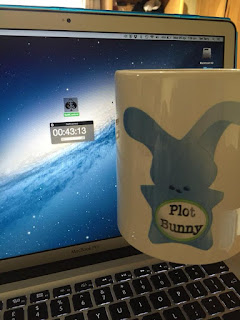 |
| Self control App - and large mug of tea - in action |
6. Keep the Faith.
Keep the faith: the right words will be there, somewhere in the mess.You can put them in the right order when the editing begins.
I have a post-it note for these moments.
A weird thing I've found out about writing as I've gone along is that what works when you are writing one story won't necessarily work when you are writing another one.
Sometimes you just have to find your way as you go.
Now...for ANYONE WHO DOESN'T KNOW WHO ERIC AND ERN ARE *shocked voice* (and I mean you, Candy), here is a snippet! All worth watching, but the famous line is at about 2:25.

 Teri Terry is the author of the Slated trilogy, Mind Games, and Dangerous Games. She should be writing book 2 of the Dark Matter trilogy (coming in 2017) right now, but was hoping writing a blog post about keeping going would give her the kick to, you know, actually get on with it. Until then, here is one she prepared earlier: Book of Lies, out on 24th March.
Teri Terry is the author of the Slated trilogy, Mind Games, and Dangerous Games. She should be writing book 2 of the Dark Matter trilogy (coming in 2017) right now, but was hoping writing a blog post about keeping going would give her the kick to, you know, actually get on with it. Until then, here is one she prepared earlier: Book of Lies, out on 24th March.Blog: Notes from the Slushpile (Login to Add to MyJacketFlap)
JacketFlap tags: Add a tag
By Nick Cross
I like films. I like writing. So perhaps it was inevitable that I would like films about writers. And once you scratch the surface, there are quite a few of them. Of course, most films start as a screenplay which has to be written by one or (more commonly) several people, so perhaps it’s not surprising that those writers occasionally turn inwards for inspiration. What is surprising about it is that writing as an activity is just about the least filmic thing ever invented, with its furrowed concentration over a keyboard, unintelligible muttering or pacing around with a half-smoked cigarette. I have never in my life pulled a sheet of paper from a typewriter, screwed it into a ball and thrown it in the bin. Yet this motion is one of the great clichés of writing in the movies. Read more »
Blog: Notes from the Slushpile (Login to Add to MyJacketFlap)
JacketFlap tags: savelibraries, Libraries and Librarians, "Kathryn Evans", More of Me, Add a tag
I've had a crazy busy week. My debut novel, More of Me, has been pushed into the world with a lot more ease than my babies were. Kind Of. The gestation period was considerably longer but the delivery a whole lot less painful. In fact, it was kind of wonderful. My friends and family ensured I had two sellout book launches and my publicists at Usborne have been shouting about my book from the rooftops. I've had some amazing reviews , so much so I can barely believe it's all happening. So, to ground myself firmly back on earth, you'll be pleased to know I am not going to talk about my book.
If you want to read about the launch it's all herebut first...
I'm going to talk about libraries.
I love libraries. A lot of authors do. In fact, very many notable figures are a major part of the campaign to Save Our Libraries because they are seriously under threat from financial cutbacks. Cathy Cassidy is a stalwart of the campaign, as is Philip Ardagh.
Ah ha! I hear you say, of course authors want to keep libraries, they are rolling in cash from all the loans. Well, not exactly. Authors currently receive just over 7 pence per loan and the full amount you can receive is capped. No author is going to become a millionaire from public lending rights money, even fellow SCBWI member Paula Harrison whose Rescue Princesses books were borrowed almost 50,000 times last year! - in fact you need around 85,000 loans to take you to the current cap. I shall let you do the maths.
It is indeed a useful income supplement for authors whose average incomes have dropped to below £11,000 per year but not, you will agree, champagne and caviar money.
So why do authors keep gathering together and banging on about saving libraries? Surely they'd be far happier if everyone went out and bought the books? Well...
No. Because most authors write to be read and the more people who read them, the better. And most authors understand that not everyone can afford a houseful of books and that not all children are born into households where books are considered important. If you want equality of education, of development, you need libraries. If you want all children to have access to the same level of resources, at the very least, you need libraries. If you want any kind of fairness in society, you need libraries.
Nick Gibb, our current minister for schools says: “Reading for pleasure is more important than a family’s socio-economic status in determining a child’s success at school,”
Children learn so much from books. Books don't just inform us of facts, or teach us how to express ourselves, children who read become better empathisers as Natascha Biebow eloquently explains on Picture Book Den. Books can comfort and distract older children from anxiety. They can help them understand the hugely complex world they are growing up in.
I know there are many adults that also rely on library services but three out of the top five library loans in 2015 were children's books. Go and visit the children's section in your local library You'll maybe see mum's and toddlers for story time - brilliant for mum's to make contact with other mums, brilliant for kids to hear stories. You'll see teens in corners checking out whether they really want to read the book whose cover looked so attractive - or furtively checking out the guides to being a teenager. You might catch a few newly independent readers excitedly looking for the next Paula Harrison or Cathy Cassidy or Philip Ardagh book. I can guarantee you, the library matters to those kids - to all teh people who use them:.
I was very lucky, I came from a house where we did have books - not a huge number, there were four of us kids and not a lot of money, but I always had a book for Christmas and my birthday or if the book fair came to our school - and my Mum made sure we got into the library habit. Once a week, off we went - and I never lost that habit. I grew up in Portsmouth library. The books I wolfed down informed the writer I am today. They really did.
I can trace the influences of all the classics: Hardy, Dickens, Bronte ( all three), Austen, Isaac Asimov, George Orwell, Frank Herbert - my appetite was voracious. Even if we'd have been a rich family, my parents wouldn't have been able to keep up. There are still kids like me using libraries. They don't all have a kindle - the just don't. I'm sorry, but you're a twit if you think they do.
So please, if you want a fair, informed, empathetic, equal society - back our libraries.
You can find out more on the Library Campaign Website.
Kathryn Evans also blogs on My Life Under Paper and you can follow her mood swings on twitter: @mrsbung Her debut novel, More of Me, is out now.
Blog: Notes from the Slushpile (Login to Add to MyJacketFlap)
JacketFlap tags: facebook, Procrastination, Candy Gourlay, Laura Dockrill, Emily Drabble, Add a tag
By Candy Gourlay
So it's February now. How's it going? Written any books lately?
It's such a struggle. I sit down to work, my good intentions shining, and what do I do? I interrupt myself. I make another cup of coffee (that I'm going to allow to go cold anyway). I go to the bathroom (even though I've already had a wee ... but why not go again, just in case?). I glance at my phone for messages (and spend the next hour or five answering texts and scrolling through Facebook). I read a passage from the book I'm currently reading (and end up reading for the rest of the morning or even, day).
Why? Why do I do it? Why do I interrupt myself like this?
I once pinned a notice that said DON'T INTERRUPT above my desk. Mind you it was to remind myself to avoid expository interruptions that take the reader out of the flow of my story. But here I am, compulsively interrupting myself when I know full well that the most important thing I need to do right now is get on with my writing.
Speaking of interruptions - may I interrupt this blog post to congratulate Kathryn Evans on the birth of her debut novel MORE OF ME today? Well done, Kathy ... we're all excited for you!
The other day, I was telling someone (on Facebook of course) how much I hated myself for even being there. She told me that she'd deleted the Facebook app from her phone so that if she wanted to visit FB, she had to deliberately fire up the laptop and connect to the internet to do so.
I thanked her and promptly deleted the Facebook app from my phone.
And turned off notifications.
It was like going cold turkey on chocolate.
Did it work?
Well at first, I was like an addict, tapping away at my phone before realising that Facebook wasn't there anymore.
Then I was checking my email account for notifications from Facebook before realising that there weren't going to be any.
THEN I got a lot of work done.
It's been a few days now. I'm out of the loop. Haven't seen the latest dog and cat videos. And though I can access FB on my laptop, I haven't done so. Much.
Wish me luck.
Hey! Candy will be appearing with Laura Dockrill in Tall Stories and Mermaid Tales at the Imagine Children's Festival. The event will be chaired by Emily Drabble, editor of the Guardian Children's Books website. Please come. 16 February 2016, 1pm, Level 5 Function Room at the Royal Festival Hall. Book tickets
Lovely Laura
Blog: Notes from the Slushpile (Login to Add to MyJacketFlap)
JacketFlap tags: similes, metaphors, Maureen Lynas, Notes from the critique group, writers' tics, writing comedy., Add a tag
Metaphors and similes.
Simile: a figure of speech involving the comparison of one thing with another thing of a different kind, used to make a description more emphatic or vivid.
Metaphor: a figure of speech in which a word or phrase is applied to an object or action to which it is not literally applicable.
Some editorial suggestions for those who love to use metaphor and simile.
- Check the appropriateness – is it right for the situation/genre/age group?
- Check the word choice - Am I being inappropriately poetical? Does the tone of the metaphor match the tone of the work?
- Check the logic - Read it as a critical reader and say ‘Really? Does it? Is it? What the hell do I mean by it?
- Check the image. What image have I created? Is that the image I want?
- Check the intensity - is it right for the emotion I want the reader to have at this point in the scene?
- Check you’re not trying to be too clever – am I bringing clarity to the text or am I confusing the reader.
- Check the frequency of metaphors and similes in some mentor texts (books from the same genre, age group etc that you think reflect what you want to achieve). I analysed a few YA books, just the first chapter.
Next tic – Inappropriate Mystery and Atmosphere
If this is your tic ask yourself -
- What is my protagonist seeing and hearing?
- What emotion is my protagonist experiencing?
- How have I transferred that into the head of my reader?
- Have I been honest with my reader?
Blog: Notes from the Slushpile (Login to Add to MyJacketFlap)
JacketFlap tags: writing ideas, January, Addy Farmer, Add a tag
by Addy FarmerDid you know that January used to be known as the Wolf month? Well, that's what the Anglo Saxons knew it as - when food was so scarce that the wolves dared to enter the villages. There's still something of the wolf about January...  |
| How'll I find those ideas?? Now, January is a time of non-wolf voluntary dieting. It's when garden life seems to hibernate (usually) and the shops are like old news and Christmas sparkle is packed away. But January is also fresh-faced and full of promise; maybe you wrote an entire novel in November with NaNoWriMo? Maybe you packed in some story-making during the Christmas holiday? Now in the month of the brand new year you have sent your precious babe out into the woods in the hope that she is picked up by someone who will love her to bits. Even if you are not waiting and waiting, sometimes January can be a curiously creatively empty month. So it's best to crack on and fill it with ideas because you never know - one of them might become a proper real story. |
“What are you?" I whispered.
He shrugged again.
"Something," he said. "Something like you, something like a beast, something like a bird, something like an angel." He laughed. "Something like that.”
David Almond - Skellig
So what to do? I write them down on a scrap of paper which I lose. Or pop an idea into a notebook in close type and think that it's the most marvellous idea EVER and then never go back to it. Or keep it in a box ready for Doomsday and forget where the box is. Useless? No, not at all because somewhere, something happens and my brain sifts and sorts so that far from being a palace it becomes more of a compost bin and every so often something germinates.
 |
| Food for thought |
Soooooo, ideas and where to always be able to find them.
This is a great source of fun and inspiration. How about The Henn-na Hotel, which translates to "strange hotel," and is staffed almost entirely by robots. Or some very important research which answers the question, 'Where should Americans retreat in the event of a zombie apocalypse?' The answer to this and more science stuff can be found in Live Science.
Old inventions
With their tortuous methods and construction old inventions make my heart skip a beat. In fact, I like then so much that I based an entire character around them with my Wilf's World Blog. Wilf loved inventions (as should we all) like the fantastically named Tempest Prognosticator or the more ordinarily named lawnmower and its inventor, Edward Bear Budding. A lot of these Victorian inventors also had brilliant names like Sir Godlsworth Gurney who invented giant machines for heating large spaces like cathedrals and who nearly blew up the Houses of Parliament. |
| The Tempest Prognosticator - early weather machine |
News stories for new stories.
There is so much weirdness out there (or maybe I'm just very tame) and it's interesting to be an onlookerYou Can Now Pay To Have Someone Call Your Friend As A Turtle
The Huffington Post is a repository of odd stories. Who wouldn't want to have a call from a turtle and mistake it for a real turtle who has gained astonishing super-powers and sends your hero off on a trail of the mad scientist who has captured this innocent creature and seeks to exploit it ...
Fly-tipper sought to blame imaginary twin brother for his crimes
Brunch news reports a fly-tipper who blamed an imaginary identical twin for illegally disposing of car tyres. Yep, there's a story right there ... |
| Blame the other one |
Images
| Honey and Izzy fall out about who is trundling through the bendy tube first |
 |
| Stuck in the mud |
| Wheel on fire |
| Ruin in the woods |
 |
| Tell me a story |
Books by the side of the bed.
Along with my to-read pile, there is also a permanent stack of books which I go for ideas.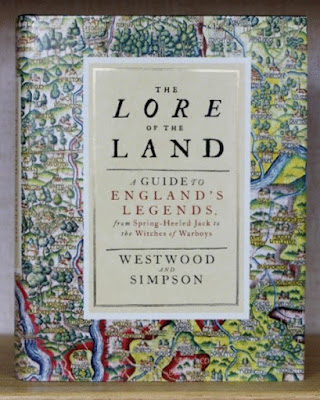 |
| Fantastic book for spooky/funny/ridiculous stories |
 |
| Magic is real ... |
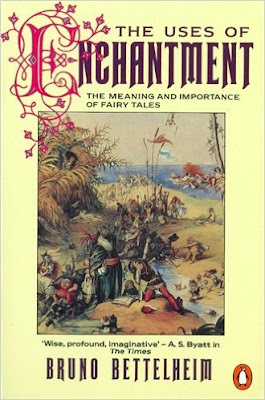 |
| dipping in to find stories behind stories There is so much more, so many places you can go, places you can see, people you can meet, astonishing stories to uncover. They won't all stick but they'll be one or two that do and what fun there is in the finding. Finally and perhaps most importantly ... |
Blog: Notes from the Slushpile (Login to Add to MyJacketFlap)
JacketFlap tags: Hero's Journey, setting, Candy Gourlay, Ordinary World, Add a tag
 |
| Delivering the eulogy at LJM's wake. Photo: Amanda Navasero |
I also wrote in the Philippine Daily Inquirer about her profound influence on my writing (I was one of the Inquirer's two reporters when it started as a weekly, then when it turned into a daily, I became a desk editor). When the article came out on Boxing Day, it amused me that though I haven't used my maiden name 'Quimpo' for 27 years, my former Inquirer colleagues inserted it into my by-line: 'Candy Quimpo Gourlay'.
This visit brought me back to the world that I left behind since I became a writer of novels: a world of intense deadlines, cigarette smoke, clackety typewriters, too much coffee, and the everlasting hunt for a good angle.
 |
| The Inquirer newsroom pauses to remember LJM at a final remembrance service . I'm so glad I happened to be in the Philippines. |
It occurred to me that in story terms, this was the Ordinary World that I left behind, the way Luke Skywalker left the moisture farm in Tatooine for adventure, Dorothy left behind black and white Kansas for technicolor Oz, and Harry Potter left behind the cupboard under the stairs for magical Hogwarts.
The Ordinary World is the first stage of the Hero's Journey, first articulated by Joseph Campbell in The Hero With a Thousand Faces, and later revised by Christopher Vogler, in a famous seven-page memo he wrote while working for Disney. The Ordinary World introduces the hero's world before he or she goes on an adventure.
The hero's ordinary world is essential to the reader's understanding of the story because it provides the circumstances upon which the hero's adventure can be enjoyed and understood.
One of the reasons for my current trip to the Philippines is to visit the setting of my next novel --
an isolated community in the Cordillera mountains. I came thinking that the task at hand was to feel, to smell, to see, to make the place I'd set my novel in more believable.
 |
| The rice terraces of the Cordilleras at sunrise. |
 |
| Walking through mountains carved into rice paddies. The tubes are to deliver water from mountain springs to the lower paddies. |
 |
The Ordinary World is often defined as setting ... the place where a character begins an adventure. But it would be a mistake to focus on it as a bit of geography or a bit of background information.
The Ordinary World is more than geography and backstory. The Ordinary World is context.
Adventure lies in how the characters leave or change the Ordinary World. Without knowing the Ordinary World of a character, it can be hard for the reader to connect with the hero's adventure.
Readers want to be thrilled, they want to be moved, they want to care about what happens to the hero. Without seeing the contrast between the hero's Ordinary World and the world of the adventure, the reader cannot feel the heartbeat of the story.
We are extra delighted by Sophie's adventure with the Big Friendly Giant because we know that she is an orphan.
We root for Katniss Everdeen in the Hunger Games because we know how desperate life is in District 12.
We worry for Auggie in Wonder when he leaves a life of home-schooled security for real school.
When introducing your character's ordinary world, it is too easy to slip into explanation and description. What matters is whether you communicate the context from which your character is about to launch into adventure.
What I've learned from this trip to the Philippines is that in a story, even place is all about character.
Ultimately, the question we must ask ourselves is: am I merely explaining my character's ordinary world or is he living it?
Blog: Notes from the Slushpile (Login to Add to MyJacketFlap)
JacketFlap tags: Add a tag
 |
| Teri Terry |
For 2016, what can I add?
 |
| Maureen Lynas |
 |
| Candy Gourlay |
 |
| Addy Farmer |
"How did it get so late so soon?
It's night before it's afternoon
December is here before it's June
My goodness how the time has flewn.
How did it get so late so soon?"
Let's live life now and to the max in 2016! Happy Christmas, friends!
 |
| Kathy Evans |
 |
| Nick Cross |
 |
| Jo Wyton |
View Next 25 Posts




